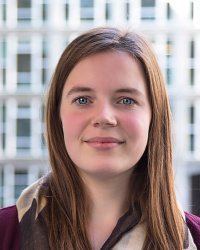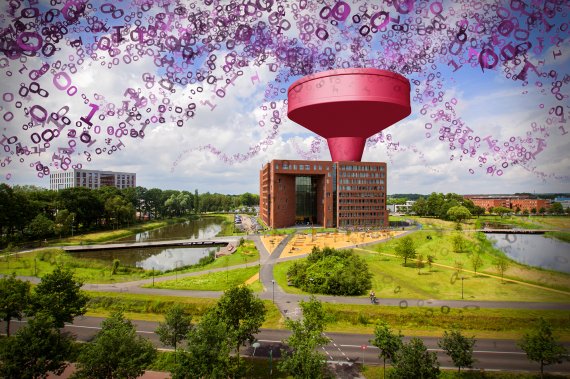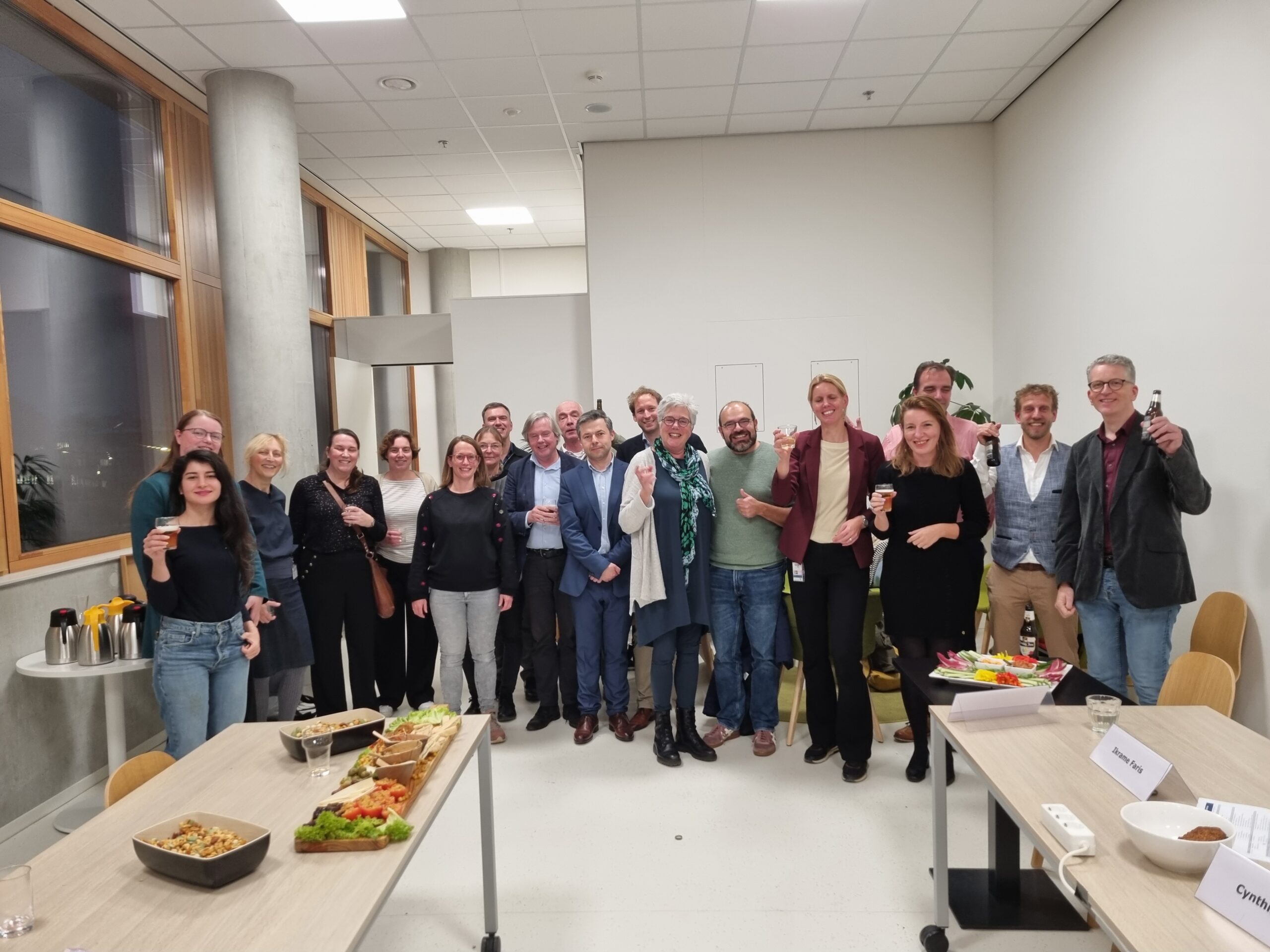Illustratie Pascal Tieman
High-tech innovations, robots and artificial intelligence are going to play a bigger and bigger role in food systems, agriculture, health and environmental interventions. And they largely revolve around data. To prepare its students better for this, Wageningen University has launched a major expansion of the range of courses related to data science. A Data Science Minor was started last year, 10 new Data Science courses have been developed, and more and more Master’s programmes are adding a Data Science track.
New skills
Data science? But surely all science makes use of data? That’s right, says Dean of Education Arnold Bregt. ‘Data is as old as science itself. You have a question, you collect data, you analyse it and then draw a conclusion. But increasing digitalization has made it easier to collect and analyse ever larger quantities of data. This means data sets are getting larger and more complex. That offers wonderful new possibilities for research but also means new skills are needed to conduct that research in the right way.’
Data is used on an ever-growing scale these days to optimize processes, make predictions, identify objects in photos with the aid of artificial intelligence, and so on. An example is the Global Detector developed by Arjen Daane and his colleagues at Wageningen Economic Research. This tool combines several data sources and algorithms to answer questions such as: which location in the world is the most suitable for growing tomatoes, or how much demand will there be for milk in Asia in 2022?
Digital twins
Another example of data science in which WUR is investing is ‘digital twins’: the making of a digital copy of a system or organism, such as a cow. Modern cowsheds measure precisely how much a cow eats, how much milk she produces, the temperature in the shed etc. By making a digital copy of this data, you can try and get a better grip on the actual situation as well as make models for predicting the future, regarding the impact of a change of diet on milk production, for instance. Scientists can make digital twins of cells, plants, animals, humans and ecosystems, as well as of more abstract things like food chains.
‘In a nutshell, data science is getting the knowledge out of data,’ says Lukasz Grus, data science education coordinator at WUR. ‘A data scientist researches the various methods of collecting, analysing, processing and visualizing data. In conventional science, data are the means of answering questions. In data science, you study this means in itself, exploring what you can get out of data and trying to solve problems by identifying patterns in data.’
In conventional science, data are the means, in Data Science, you study that means
Lukasz Grus, Data Science education coordinator
The role of Wageningen
In his role as education coordinator, last year Grus took stock of what Wageningen University already had to offer in the field of data science. ‘I saw that we were already doing quite a bit, but all of it applied within our academic fields. We don’t have a separate Data Science Master’s here, but we do teach students applied data science.’ He gives examples such as the degree programmes in Geo-Information Science, Biosystems Engineering and Bioinformatics. ‘These are pretty much Data Science Master’s programmes within particular fields.’
That approach suits Wageningen, says Bregt. ‘Master’s degrees in Data Science are springing up all over the place in the Netherlands, but we prefer to leave the training of hard-core data scientists and the development of new algorithms to universities like Delft and Eindhoven. By training data scientists within our domain, we at Wageningen play a bridging role. Data science in context. Because it’s one thing to combine incredible amounts of data and calculate something with them, but you’ve also got to be able to assess whether the links you find actually make sense. I think that’s a great role to play, and it also gives you added value on the market.’
You’ve got to be able to assess whether the links you find actually make sense
Arnold Bregt, Dean of Education
New courses
For the university to fulfil that role satisfactorily, it needs to expand what it offers in the way of Data Science courses. The subject involves a range of skills, explains Bregt. ‘You need to know a bit about statistics, artificial intelligence and data collection. And visualization is important too: how do you present your results? The ethics of it is another important aspect of it, in terms of privacy for example. And there’s your choice of working method. Some methods tend to push you towards certain answers. You’ve got to think about that.’
A range of skills, then, which require a range of courses. Some of those courses were already up and running, and some still needed developing. Bregt: ‘In one year, we have developed 10 new courses that are already being taught this year. Technical and methodological courses about how you should analyse data, a number of advanced courses on data science in context, such as Data Science for Health, Data Science for Ecology and Smart Environment, and a course on data and ethics.’ Master’s programmes can offer a combination of these courses as a track. Bregt: ‘Students who opt for a track like that become data scientists in their chosen field. So we are educating students with data skills plus substantial knowledge of their subject area, who also think about their ethical responsibilities as scientists.’
Essential skills
If data science is so important, shouldn’t it be made a compulsory component of every degree programme? Bregt: ‘Wageningen University’s core task is to teach students to do good research within a discipline. Being able to handle data well is an essential skill for good research: everyone who graduates from Wageningen should be capable of that. But that doesn’t mean every student should become a data scientist as such. If you do want to do that, though, it is our duty as a university to facilitate that.’ Ten new courses and nine new Master’s tracks constitute a big step towards that objective, thinks Bregt. ‘We’ve got the building blocks. So now we can expand and look at how we can also develop Master’s tracks for the degree programmes that do not yet have Data Science tracks. That move towards optimization is starting now.’
Counting animals with data
How do you go about a game count in an African national park hundreds of square kilometres in size? ‘In the old days, you and your team took a helicopter flight over the park and you all counted animals,’ says Lukasz Grus, Data Science coordinator at WUR. ‘The plus side: fun to do. The downside: expensive and not very accurate. Devis Tuia and Benjamin Kellenberger at Geo-Information Science and Remote Sensing came up with a method that is both more accurate and cheaper. They flew a drone over the land, which shot over 150 aerial photos per square kilometre. Then they used a form of artificial intelligence known as deep learning. In simplified terms, they taught a computer programme to recognize animals in aerial photos.’
The computer program got some human support with this task. First, hundreds of volunteers identified animals on the aerial photos. The scientists then fed those photos into the programme to show it which pixels were animals and which ones were rocks or bushes. The programme analysed that input and then started identifying animals itself. The output was then checked by people. A points system was used, and if the programme had mistaken a bush for an animal, it dropped one point. If it had missed animals on the photo entirely, it dropped 80 points. This taught the algorithm to distinguish animals from bushes, and especially not to miss any animals. ‘Now the programme might say: these pixels are 90 per cent certain to be a wildebeest, or those pixels there are 80 per cent certain to be an antelope,’ says Grus. Using this program, just one person can now count all the game in the park in a week.

Subject specialist with data skills
Maartje Holtslag (25) did the WUR Master’s in Geo-Information Science. ‘That is actually a Data Science Master’s that focuses on spatial data.’ In short, training to become a subject specialist with data skills. During her Master’s internship at the Environmental Systems Research Institute (ESRI), Holtslag did an assignment for the Dutch Society for the Blind. ‘They want to create routes for blind people so they need to know where the zebra crossings are. It might sound odd, but there is no overview of them anywhere in the Netherlands. So I trained a computer model to detect zebra crossings automatically in aerial photos.’ To do that, Holtslag first had to make training data. ‘I drew surfaces on zebra crossings on photos, which the model could use as examples. Then I put new photos into the model to see if it recognized zebra crossings on those.’
I trained a computer model to detect zebra crossings in aerial photos
Maartje Holtslag, Geo-Information Science graduate
After graduating with her degree, Holtslag got a job as a programmer at ESRI. ‘I find out things like which roofs have solar panels on them. Or I use data from cameras at junctions to see how many cars and cyclists cross them. That enables you to work out whether the cycle path is safe or how the coordination of the traffic lights could be improved. As a programmer, you focus on the technical side of it. So it’s not my job to analyse the results, it’s more about obtaining the results.’
Holtslag thinks WUR has made the right choice with its strategy of educating subject specialists with data skills. ‘With data science you can end up in lots of different jobs, but most of them are within a specific subject area. So you want to know the subject area well and to be able to handle data.’
Interested in data science? These are the options
Bachelor’s:
You can take Data Science courses as electives. They include Data Management, Programming in Python, Big Data, and Biological Data Analysis and Visualization. You can also do a Data Science Minor which combines several Data Science courses.
Master’s:
The Master’s programmes in Geo-Information Science, Biosystems Engineering and Bioinformatics are so data-oriented that in practice they are subject-related Data Science Master’s programmes. Six other Master’s programmes offer Data Science tracks or clusters of Data Science courses. These are: Biology, Earth and Environment , Forest and Nature Conservation, Nutrition and Health, Plant Biotechnology and Plant Sciences. Every Master’s programme gives you the option of taking Data Science courses as electives.
You can find a complete overview of the Data Science courses here.




